- Home
- Kay Hooper
Touching Evil Page 2
Touching Evil Read online
Page 2
“Andy?” Her voice was very gentle.
“Sorry, Maggie.” He shifted uncomfortably, ruefully aware that he probably looked for all the world like a scolded schoolboy.
John stepped toward them. “It’s my fault, Miss Barnes. I asked Andy to bend the rules. My name is—”
“I know who you are, Mr. Garrett.” Her gaze was direct, her voice matter-of-fact. “But some rules apply to you too, whether you like it or not.”
“It wasn’t a question of rules not applying to me. I have special permission to observe the investigation.” He only just managed not to sound defensive, which surprised him.
“And that includes watching and listening like a voyeur while a shattered woman forces herself to remember a nightmare you can’t even begin to imagine? Is that the observing you were given permission to do?”
John stiffened, but her accusation struck a nerve and left him at least momentarily silent. Maggie didn’t wait for a response but went on coolly. “How would you feel, Mr. Garrett, if two strange men had watched and listened in silence and secret while someone you cared about relived the entire horrific experience of being brutally raped and maimed by an animal?”
That struck more than a nerve. He drew a breath and let it out slowly. “You’re right. I’m sorry.”
Andy said, “Sounded like you were reaching her there for a minute. The interruption won’t help things, will it?”
“No. No, it won’t help things. I’ll try again, but she may not be willing to talk to me anymore today.”
John felt the reproach, even though she wasn’t looking at him. “I’m sorry,” he said again. “I didn’t intend to interfere. That’s the last thing I want to do.”
“Fine. Then you won’t mind leaving.” She stepped back, holding the door open in a clear invitation—if not a command—for them to leave.
Andy wasted no time in obeying, but John paused in the doorway and met her gaze steadily. “I would like to talk to you, Miss Barnes. Today, if possible.”
“If you want to wait around, suit yourself.” Her tone was indifferent, but the steady golden eyes never left his. “I may be a while.”
“I’ll wait,” John said.
Hollis was awake but didn’t move or make a sound to indicate that. For the first few moments it was always like this, tension and terror until her scrambling mind left nightmare and caught up with reality.
Which was also a nightmare.
The bandages over her eyes—over where her eyes had once been—were becoming a familiar weight. She didn’t yet know how she felt about the fact that beneath those bandages were now someone else’s eyes. An accident victim who had lost her life but left a signed donor card behind.
The surgeon, proud of his groundbreaking work, had been surprised and rather aggrieved when Hollis’s only question had been one he obviously considered unimportant.
“What color are they? Miss Templeton, I don’t think you understand the complexity—”
“I understand, Doctor. I understand that you believe medical science has advanced to the point that I’ll be able to see with this poor woman’s eyes. And I understand that it’ll be days at least, possibly weeks, before we find out if you’re right. In the meantime, I’m asking what color my . . . new . . . eyes are.”
Blue, he’d said.
Her old ones had been brown.
Would she be able to see? She didn’t know, and she suspected that her doctor, for all his confidence in his abilities, was unsure of the surgery’s outcome as well. The optic nerve was a tricky thing, he didn’t have to tell her that. And then there were all the other nerves, the blood vessels, the muscles. Far too many tiny connections to be certain of anything. They didn’t think her body would reject the new eyes, and antirejection drugs would probably make certain of that, but nobody seemed nearly as sure what her brain might do.
Vision was as much the mind’s interpretation of images as it was anything else, after all. With the intricate connection between organ and mind severed and then painstakingly rebuilt, who really knew what her brain’s response might be?
Hell, maybe it was no wonder she hadn’t even been able to decide how she felt about it.
Most of the other physical injuries had been surprisingly minor, given everything she’d been through. The broken ribs were healing, though she still breathed carefully, and doctors had repaired the puncture in her lung. A few stitches here and there. Scrapes and bruises.
Oh—and she’d never be able to have children, but what the hell. No kid needed to be saddled with a probably blind, certainly emotionally wrecked mother anyway, right? Right.
I know you’re awake, Hollis.
She didn’t move, didn’t turn her head. That voice again, quietly insistent, as it had been virtually every day of the past three weeks. She’d asked a nurse once who it was that came to visit her and sit by her bed hour after hour, but the nurse had said she didn’t know, hadn’t seen anyone except the police officers who came regularly to ask gentle questions Hollis didn’t answer.
Hollis had so far refused to question the voice, just as she refused to speak to the cops or say any more than absolutely necessary to the doctors and nurses. She wasn’t ready to think about what had happened to her, far less talk about it.
You’ll be able to leave soon, the voice said. What will you do then?
“Stepping in front of a bus might be a good idea,” Hollis said calmly. She spoke aloud to remind herself that hers was really the only voice in the room. Of course it was. Because that other voice was just a figment of her imagination, obviously.
If you really wanted to die, you never would have crawled out of that building.
“And if I wanted rational platitudes from a figment of my imagination, I’d go back to sleep. Oh, wait—I am asleep. I’m dreaming. It’s all just a bad dream.”
You know better.
“Better that it happened? Or better that you aren’t just a figment of my imagination?”
Instead of answering either question, the figment said, If I handed you a lump of clay, what would you make, Hollis?
“What kind of question is that? One of those inkblot questions? Is my figment psychoanalyzing me?”
What would you make? You’re an artist.
“I was an artist.”
Before, you created art with your hands and your eyes and your mind. Whether or not the surgery is successful, you still have your hands. You still have your mind.
The figment, Hollis realized, didn’t believe she’d be able to see with these borrowed eyes either. “So I should just turn myself into a sculptor? It isn’t quite as simple as that.”
I didn’t say it was simple. I didn’t say it would be easy. But it would be a life, Hollis. A rich, creative life.
After a moment, Hollis said, “I don’t know if I can. I don’t know if I’m brave enough to start over.”
You’ll have to find out, then, won’t you?
Hollis smiled despite herself. So her figment could offer more than knee-jerk platitudes, after all. And the challenge was unexpectedly bracing. “I guess so. That or go looking for that bus to step in front of.”
“Miss Templeton? Were you speaking to me?” The day-shift nurse was a bit hesitant as she approached the bed.
Hollis was learning to read footsteps, even the nearly soundless ones of the nurses. This nurse feared for Hollis’s sanity; it wasn’t the first time she’d caught the patient talking to herself.
“Miss Templeton?”
“No, Janet, I wasn’t speaking to you. Just talking to myself again. Unless there’s somebody sitting in that chair beside the bed, of course.”
Warily, Janet said, “No, Miss Templeton, there’s nobody in the chair.”
“Ah. Well, then, I must have been talking to myself. But don’t let it worry you. I did that even before the attack.” She had learned to refer to it that way, as “the attack.” It was the phrase the doctors used, the nurses, the cops.
“Can I—can I get
you anything, Miss Templeton?”
“No, Janet. No, thank you. I think I’ll take a nap.”
“I’ll make sure nobody bothers you, Miss Templeton.”
Hollis listened to the footsteps recede and pretended to be asleep. It wasn’t difficult.
The hard part was keeping herself from asking aloud if the figment was still here. Because it couldn’t be, of course.
Unless she really was crazy.
“We’re no further along than we were when you were here six weeks ago.” Luke Drummond, the lieutenant in charge of detectives in this division of the Seattle P.D., was accustomed to reporting to his superiors, but he disliked being obliged to divulge details of an ongoing investigation to a civilian, and his hostility showed. Especially since he couldn’t report any progress.
“There’ve been two more victims since then.” John Garrett kept his voice level. “And still no evidence, no clues to lead you any closer to identifying this bastard?”
“He’s very good at what he does,” Drummond said.
“And you aren’t?”
Drummond’s eyes narrowed, and he leaned back in his chair, deceptively relaxed. “I have a very skilled and experienced squad of detectives, Mr. Garrett. We also have some damned good forensics experts on the payroll, and state-of-the-art equipment. But none of that is much good when there’s no evidence to study or witnesses to question and when the victims are, to say the least, traumatized and unable to give us much to go on.”
“What about Maggie Barnes?”
“What about her?”
“She hasn’t come up with anything useful?”
“Well, as everybody keeps reminding me, what she does is an art—and apparently it can’t be rushed.” He shrugged. “In all fairness to Maggie, she hasn’t had much more to work with than the rest of us. The first two victims are—well, I don’t have to tell you. But neither gave us anything much to go on right after the attacks. The third is just now well enough physically to sit down and talk to Maggie. And the fourth is not only still in the hospital but so far hasn’t been willing to answer even the simplest question from any of us. All the shrinks tell us that if we push these women we’ll lose any chance we might have of gaining any relevant information from either of them.”
“Why haven’t you called in the FBI?” John demanded.
“Because there’s nothing they can do that we can’t,” Drummond replied tersely.
John wasn’t so sure about that, but he knew he was on the edge of alienating Drummond completely and dared not push any harder. Pulling the right strings had gotten John access to the investigation, but if Drummond wanted to, he could make that access fairly useless.
Holding his voice level, he said, “So the consensus is that Maggie Barnes is your best bet to get something useful from the victims?”
“If anybody can guide those women back through the hell they experienced without hurting them even more, it’s Maggie. Whether she gets anything we can use is something else. We’ll just have to wait and see.” He watched John Garrett shift in his chair almost unconsciously and for the first time felt a genuine pang of sympathy for the other man. He might be a pain in the ass at the moment, but his motives were certainly understandable, and Drummond could hardly blame him for muscling in on the investigation. In Garrett’s place, Drummond thought he’d probably do the same.
Assuming, of course, that he had a billion or so dollars and a shitload of political influence to make both the chief and the mayor practically piss their pants in their eagerness to be cooperative.
Luke Drummond would have loved to have at least that political influence; he intended to sit in the governor’s mansion one day. He hadn’t made any secret of his political aspirations and, despite not being an elected official, tended to react to any situation as a politician rather than a cop, but to date that hadn’t hurt either his present career or his ambitions. He was enough of a cop to be able to do his job and do it well.
At least until this damned psychopath had turned up.
At the moment, however, Drummond had neither Garrett’s political juice nor his money, so it was in the cop’s best interest to be at least courteous to the man.
“Maggie needs time to interview the two surviving victims,” he said evenly. “We have to be patient.”
“He attacked Hollis Templeton a little more than three weeks ago; how much longer do you think he’ll wait before he acts again?” John heard the edgy tension in his own voice, but he was beyond being able to hide it.
Drummond sighed. “According to the shrinks, he could grab another woman tomorrow—or six months from now. So far, he hasn’t established any kind of time pattern we can identify. There were two months between the first two victims, but he grabbed the third only two weeks later. Then he waited nearly three months to strike a fourth time.”
“No pattern,” John echoed.
“And nothing else to hang our hats on. No blood evidence other than the victims’, and he was smart enough to wear condoms, so there’s been no semen found. Nothing under the fingernails of the victims, no hair or fibers found on them or anywhere near them, nothing to identify where he might have held them. They’re always dumped someplace else afterward, a remote or at least unoccupied building. Ellen Randall remembers being transported inside something, the trunk of a car, she thinks, but since he stuck to pavement we didn’t find any tire tracks.”
“How was Hollis Templeton transported?”
“We don’t know, not yet. I told you, she’s not answering our questions. Her doctors say Maggie can try talking to her in a few days. That’s if she’s agreeable, and she probably won’t be, since she hasn’t been anxious to talk to us so far.”
“What then?”
“I don’t know.” Drummond sighed again. “Look, Garrett, I’m sorry as hell, but there’s nothing more I can tell you, at least not at the moment. We’re doing the best we can. And that’s all.”
Andy was waiting for John around the corner from Drummond’s office and offered a wry “Told you so.”
“I can see I’m going to make myself real popular around here,” John said.
“Oh, don’t mind Drummond. He’s a nice enough guy, for a politician.”
“I’d rather he were just a cop.”
“Yeah, so would most of us. But we comfort ourselves with the certainty that he won’t be around long, just long enough to get a secure toehold to boost himself higher up the food chain. In the meantime, however, we’re stuck with him.”
Andy led the way to his own corner of the bullpen, snagging two cups of coffee as they passed the pot.
“Jeez, Andy, take it all, why don’t you?” a nearby younger cop grumbled. “You could at least make another pot.”
“I made the last one, Scott. Your turn.”
John sat in Andy’s visitor’s chair and accepted one of the cardboard cups. He took a sip, grimaced, and said, “This is really lousy coffee, Andy.”
“Usually is, no matter who makes it.” Unoffended, Andy took a healthy swallow of his own and shrugged. “You going to wait around for Maggie?”
“Do you think she’ll talk to me?”
Andy thought about it. “Well, you pissed her off, so it’s hard to say. Just what is it you’re hoping she’ll tell you, John?”
There was no easy answer to that, and John let the silence build for a few moments before he finally replied with a question of his own. “Why are all of you so convinced she’s your best chance of catching this bastard? What is it that’s so special about Maggie Barnes?”
Andy leaned back in his chair until it creaked in protest, and took another swallow of coffee. He studied the man across from him, wondering how much to say. Wondering how much would be believed. John Garrett was a hardheaded, hard-nosed businessman who’d made a fortune by understanding the cold logic of finance; Andy hadn’t known him long, but common sense told him John wasn’t the sort of man to easily accept anything he couldn’t see with his own eyes or hold in his h
ands.
“Andy?”
“Maggie has . . . a knack, John. You can call it exceptional skill, or talent amounting to genius, or amazing empathy, but whatever you call it, the result is that she talks to shattered victims of crimes and from the little they’re able to tell her she manages to give us a face we can look for.”
“I didn’t think police even used sketch artists anymore. Isn’t there a computer program just as good?”
“Not as good as Maggie.”
“She’s that talented?”
Andy hesitated, then sighed. “Talent’s only part of it, though she has that in spades. She could make a fortune as a real artist, but instead she spends her days sitting in cramped interview rooms listening to horror stories I hope you never have to listen to. She listens, and she talks to those people, and somehow she helps them relive a nightmare without letting it destroy them. And then she comes out and starts drawing and nine times out of ten gives us a sketch so accurate the guy could use it on his driver’s license.”
“Sounds like magic,” John said dryly.
“Yeah. It does, doesn’t it? Looks like it sometimes too. I don’t know how she does it. Nobody here knows how she does it. But we’ve learned to trust her, John.”
“Okay. Then why doesn’t she have a sketch of the rapist yet?”
“Because not even Maggie can work with nothing.The women haven’t seen anything. And besides that— the first victim died before anybody could talk to her, the most recent one is still in the hospital, and you saw what kind of shape Ellen Randall’s in.”
“You didn’t mention Christina,” John forced himself to say.
Andy gazed at him steadily. “I didn’t think I had to. She did the best she could for us, but she didn’t see anything either.”
“Maggie Barnes talked to her, didn’t she? That’s what you told me, what the report said.”
“Yeah, she talked to Christina.”
“Without witnesses?”
Slowly, Andy frowned. “Without anybody in the observation room, if that’s what you mean.”
“Then maybe she can tell me something none of the rest of you can tell me.”
“Like what?”

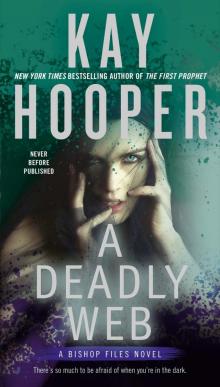 A Deadly Web
A Deadly Web Raven on the Wing
Raven on the Wing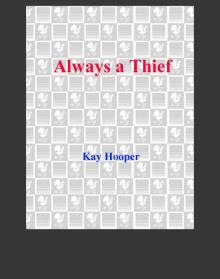 Always a Thief
Always a Thief Star-Crossed Lovers
Star-Crossed Lovers Blood Dreams
Blood Dreams Shades of Gray
Shades of Gray Rebel Waltz
Rebel Waltz Chill of Fear
Chill of Fear Sleeping With Fear
Sleeping With Fear After Caroline
After Caroline Time After Time
Time After Time Haunting Rachel
Haunting Rachel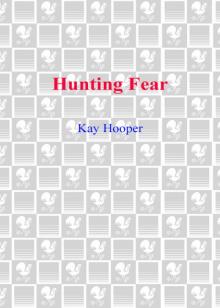 Hunting Fear
Hunting Fear Out of the Shadows
Out of the Shadows Whisper of Evil
Whisper of Evil Blood Sins
Blood Sins Hiding in the Shadows
Hiding in the Shadows C.J.'s Fate C.J.'s Fate C.J.'s Fate
C.J.'s Fate C.J.'s Fate C.J.'s Fate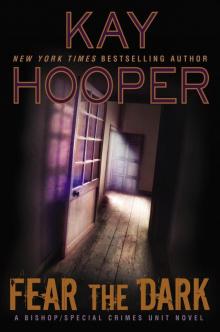 Fear the Dark
Fear the Dark Illegal Possession
Illegal Possession Stealing Shadows
Stealing Shadows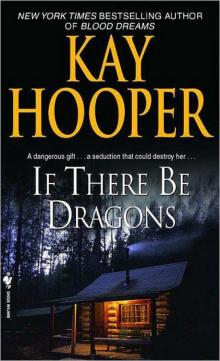 If There Be Dragons
If There Be Dragons Once a Thief
Once a Thief In Serena's Web
In Serena's Web On Wings of Magic on Wings of Magic
On Wings of Magic on Wings of Magic Hostage
Hostage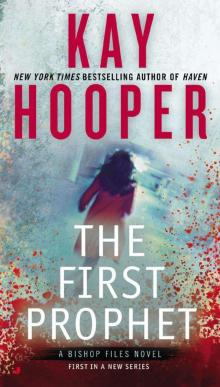 The First Prophet
The First Prophet Through the Looking Glass
Through the Looking Glass Golden Flames
Golden Flames Finding Laura
Finding Laura Haven
Haven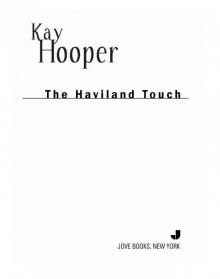 The Haviland Touch
The Haviland Touch The Lady and the Lion
The Lady and the Lion Haunted
Haunted Velvet Ligntning
Velvet Ligntning Blood Ties
Blood Ties Adelaide, the Enchantress
Adelaide, the Enchantress The Matchmaker
The Matchmaker Golden Threads
Golden Threads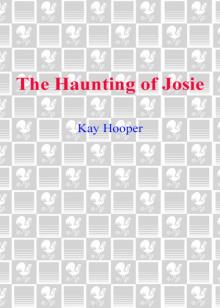 The Haunting of Josie
The Haunting of Josie Rafferty's Wife
Rafferty's Wife Amanda
Amanda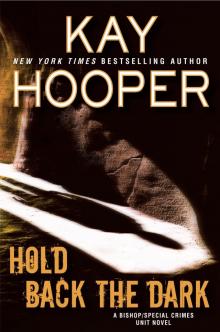 Hold Back the Dark
Hold Back the Dark Sense of Evil
Sense of Evil What Dreams May Come
What Dreams May Come Larger Than Life
Larger Than Life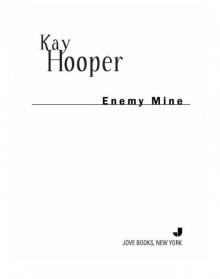 Enemy Mine
Enemy Mine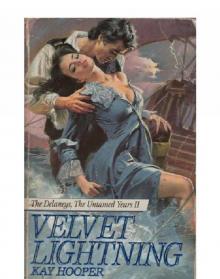 Velvet Lightning
Velvet Lightning The Fall of Lucas Kendrick
The Fall of Lucas Kendrick Aces High
Aces High Captain's Paradise: A Novel
Captain's Paradise: A Novel The Wizard of Seattle
The Wizard of Seattle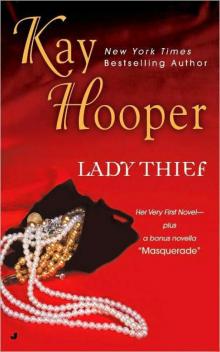 Lady Thief
Lady Thief Summer of the Unicorn
Summer of the Unicorn Outlaw Derek
Outlaw Derek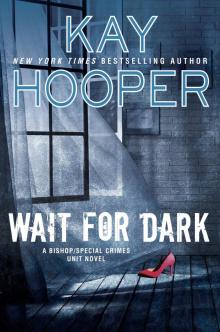 Wait for Dark
Wait for Dark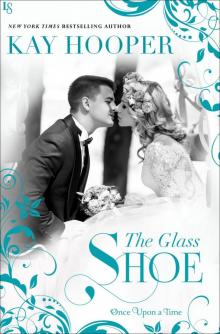 The Glass Shoe
The Glass Shoe It Takes a Thief
It Takes a Thief Zach's Law
Zach's Law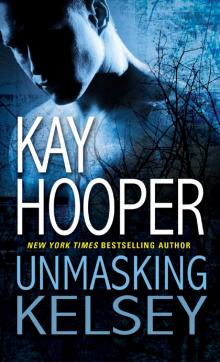 Unmasking Kelsey
Unmasking Kelsey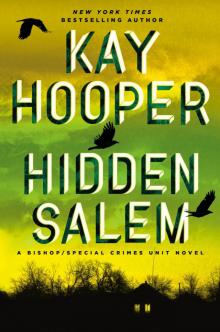 Hidden Salem
Hidden Salem